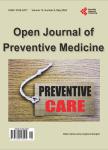Sickle Cell Gene Transmission: Do Public Servants in Tamale, Ghana Have the Right Knowledge and Attitude to Curb It?
Sickle Cell Gene Transmission: Do Public Servants in Tamale, Ghana Have the Right Knowledge and Attitude to Curb It?作者机构:Department of Human Biology School of Medicine and Health Sciences University for Development Studies Tamale Ghana Savelugu District Hospital Savelugu Ghana
出 版 物:《Open Journal of Preventive Medicine》 (预防医学期刊(英文))
年 卷 期:2015年第5卷第6期
页 面:299-308页
学科分类:1002[医学-临床医学] 100214[医学-肿瘤学] 10[医学]
主 题:Sickle Cell Disease Public Servants Knowledge Attitude Tamale
摘 要:Introduction: Sickle cell disease (SCD) is exerting enormous public health and economic burden on many countries. To reduce these effects, the World Health Organization is urging countries, especially those in Africa, to increase public awareness of this disease. This study accessed whether public servants in Tamale, Ghana possess adequate knowledge and positive attitude towards SCD. Method: A total of 320 public servants within the Tamale Metropolis were invited to complete a questionnaire in a cross-sectional study. Data were analyzed using GraphPad 5.01. Association between different variables was tested. Results: The media was the main source of information for a majority of the 94.2% of respondents who had ever heard of SCD. Knowledge of respondents on transmission and testing of SCD was above 70% but they recorded less than 40% in SCD’s incurability, prevalence, effect of SCD on life span and pregnancy. The mean knowledge score of respondents was (11.1 ± 5.11)/22 or 50.7%. Only about a quarter knew their sickling status or that of their spouses before marriage or first child. Although 78.0% of respondents would call off marriages if they became aware of genetic incompatibility, the overall mean attitude, (2.857 ± 1.97)/ 7.0% or 40.8% was poor. There was a positive and significant correlation between the knowledge of respondents and their attitude towards SCD (r = 0.494, p 0.0001) hence respondents working in the health sector and those with tertiary level education had better attitudes towards SCD. Conclusion: Public servants in Ghana have moderate knowledge of SCD but their attitude towards the disease was poor. Public servants least considered genetic incompatibility before entering conjugal relationships. This poor attitude means the campaign for the reduction of sickle cell gene transmission must be intensified. Governments need to increase their investment on educational campaigns aimed at changing attitude of persons through provision of more knowledge



